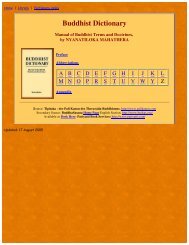The Three Basic Facts of Existence II: Suffering (Dukkha) - Buddhist ...
The Three Basic Facts of Existence II: Suffering (Dukkha) - Buddhist ...
The Three Basic Facts of Existence II: Suffering (Dukkha) - Buddhist ...
- No tags were found...
You also want an ePaper? Increase the reach of your titles
YUMPU automatically turns print PDFs into web optimized ePapers that Google loves.
dukkha can be looked at in three ways. First, one’s body does not work as well as one wouldlike. <strong>The</strong> limbs no longer function strongly, or one’s internal organs break down so that foodcannot be digested, or urine excreted … or a hundred and one other symptoms <strong>of</strong> decay. <strong>The</strong>second aspect <strong>of</strong> decay is the failing <strong>of</strong> the five senses, especially <strong>of</strong> sight and hearing. Third isthe decline <strong>of</strong> the mind, memory falters, thoughts wander, or the mind no longer understandsthings clearly. In the first case with the decay <strong>of</strong> limbs and organs, and even with the failure <strong>of</strong>the senses, though there may be physical pain it does not follow that the person affectedbecomes miserable. But with the decay <strong>of</strong> the mental functions ability to choose the ways <strong>of</strong>Dhamma which lead away from dukkha are limited and with a lack <strong>of</strong> understanding, dukkhacannot be avoided. So no pro<strong>of</strong> is necessary that “decay is dukkha” since this is commonknowledge and readily seen all around ourselves, if not in ourselves.So why has this aspect <strong>of</strong> dukkha to be mentioned? <strong>The</strong> answer is that although it lies in waitfor most <strong>of</strong> us (unless we die before ageing is manifest), we do not consider it enough. We mayeven try to forget it and while young one’s pride in youth can manage to do this. So “decay isdukkha” is listed here by the Buddha just to remind all <strong>of</strong> us, since our ordinary, deluded mindstend to overlook it. We wish to gloss over the time to which it is the prelude, for how many <strong>of</strong>us contemplate our deaths with equanimity?Born already, and now, whether young or old or somewhere between, we should be ready tomeet with disease. Any form <strong>of</strong> disease must be dukkha whether it afflicts the body or the mind.3<strong>The</strong> Buddha says that we may pass a whole lifetime even to the age <strong>of</strong> one hundred yearswithout bodily disease but that it is rare indeed to find a person who is free from mental diseaseeven for an instant. So although the innumerable diseases <strong>of</strong> the body are common enough, thediseases <strong>of</strong> the mind—springing from the evil roots <strong>of</strong> greed, aversion and delusion, arecommon to everyone all the time, unless we have seen completely the Dhamma in ourselves.Our Teacher has praised health, saying, “health is the highest gain,” 4 and if one takes this also torefer to freedom from all tendencies to mental disease, how true is this praise! Even if it refersonly to bodily disease, still good health is an excellent “gain,” one that will be enjoyed if one hasmade much good kamma by not harming beings and other compassionate actions. But socommon are diseases, and the Pāli word “byādhi” includes slight ailments as well, that in alifetime it will be very unusual to escape without some experience <strong>of</strong> this dukkha.Here again, the emphasis given to “disease is dukkha” is for the same purpose that we havenoted above—our minds tend to shy away from considering disease. Our good health (andsometimes our minor ailments!) are the subject for amiable conversation but we find manypeople who loathe to talk about disease when personally they may be subject to it. This is a part<strong>of</strong> rejection <strong>of</strong> the unliked, the opposite <strong>of</strong> happily grasping at what is liked. Other examples canbe seen in the favour bestowed on birth (babies are kissed and admired) and youth, withopposite reactions to death (who is keen on corpses?) and decay. Drifting on in this way we canonly make more dukkha for ourselves. Disease is not an aspect <strong>of</strong> dukkha to hide from: it issomething to consider. “Now I am healthy in body and able to practise Dhamma in many ways.When disease comes I may not be able to do so, therefore Dhamma must be practised by menow and to the best <strong>of</strong> my ability.”<strong>The</strong> course <strong>of</strong> dukkha running throughout life—birth, decay and disease, made bearable bythe pleasure <strong>of</strong> the senses and <strong>of</strong> the mind, runs on to death. To many people this threatens to bethe greatest dukkha though this is because we think <strong>of</strong> it in the wrong way. Really, instead <strong>of</strong> anogre who lies in wait for all who have set their feet on the trail <strong>of</strong> life, death is just a rather3It seems that the Commentaries understand only bodily disease here but our description should becomprehensive since mental ills have been called a disease by the Buddha.4Dhp 204.8
















